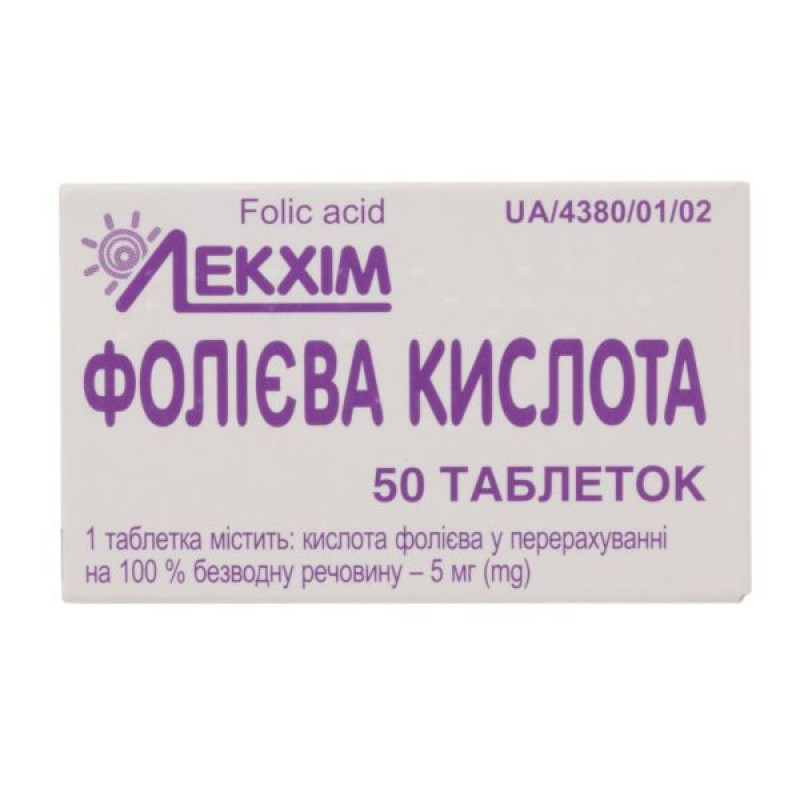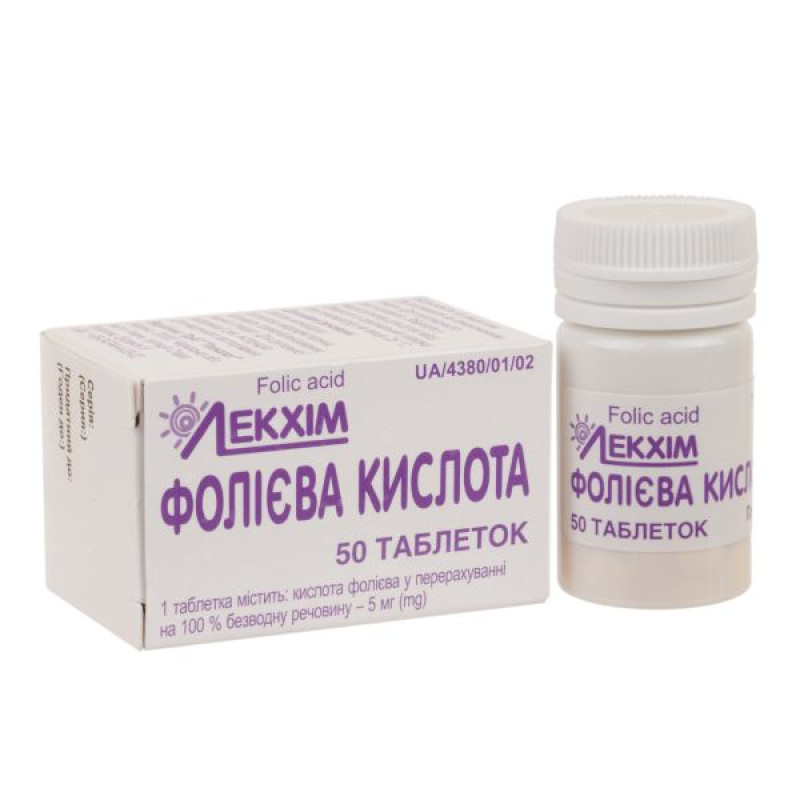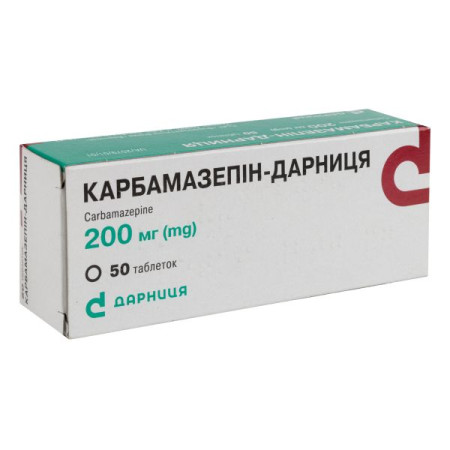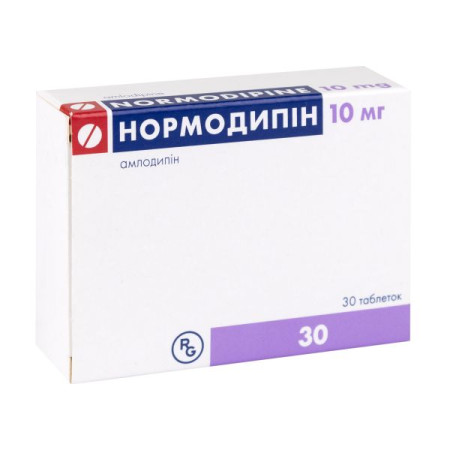Folic acid tablets 5 mg container No. 50
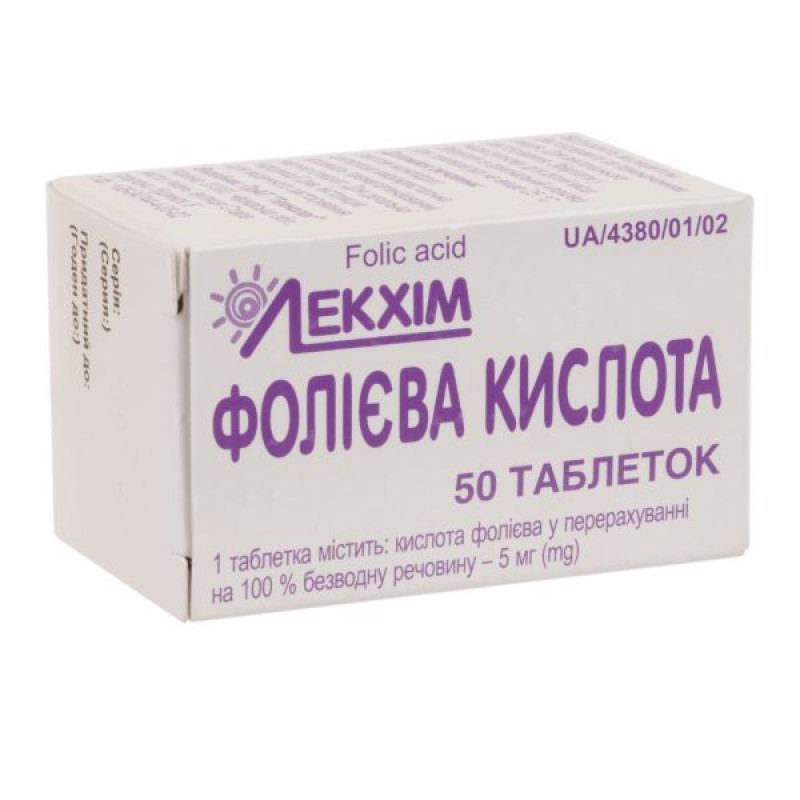
Instructions Folic acid tablets 5 mg container No. 50
Composition
active ingredient: folic acid;
1 tablet contains folic acid in terms of 100% anhydrous substance 1 mg or 5 mg;
Excipients: lactose monohydrate, microcrystalline cellulose, pregelatinized starch, magnesium stearate.
Dosage form
Pills.
Main physicochemical properties:
1 mg tablets are single-layer, round tablets, light yellow to yellow in color, with flat upper and lower surfaces and beveled edges. Minor inclusions are allowed on the surface of the tablet. A relatively uniform structure is visible when broken under a magnifying glass;
5 mg tablets are round, single-layer tablets, yellow to dark yellow in color, with flat upper and lower surfaces and beveled edges. Minor inclusions are allowed on the surface of the tablet. A relatively uniform structure is visible when broken under a magnifying glass.
Pharmacotherapeutic group
Folic acid and its derivatives. Folic acid. ATC code B0ZV B01.
Pharmacological properties
Pharmacodynamics
After taking the drug, folic acid is reduced to tetrahydrofolate, which acts as a coenzyme involved in various metabolic processes. It is necessary for the normal maturation of megaloblasts and the formation of normoblasts. Stimulates erythropoiesis, participates in the synthesis of amino acids (including methionine, serine, glycine and histidine), nucleic acids, purines, pyrimidines, participates in choline metabolism. Performs a protective function against the effects of teratogenic factors. In addition, it contributes to the normal maturation and functioning of the placenta.
Folic acid plays an important role in the process of sperm maturation and can be used to treat male infertility.
Folic acid deficiency causes megaloblastic hematopoiesis, which in pregnant women can lead to the development of congenital defects in the fetus (neural tube defect, hydrocephalus). The most important consequence of folic acid deficiency is a decrease in the ability to repair damaged tissues.
Pharmacokinetics
Folic acid is well and completely absorbed from the gastrointestinal tract, mainly from the duodenum and small intestine. It is evenly distributed throughout all tissues, selectively concentrated in the cerebrospinal fluid. The highest concentration in blood plasma is reached within 30 to 60 minutes after oral administration.
In plasma and liver it is metabolized to 5-methyltetrahydrofolate, an active substance that binds to glutamic acid and forms a coenzyme. Approximately 50% of the total folic acid supply is stored in the liver. About 70% is bound to plasma proteins. It is excreted in the urine by glomerular filtration. After taking a dose of 5 mg, folic acid will be excreted in the urine after 5 hours.
Indication
Treatment and prevention of anemias associated with folic acid deficiency: macrocytic anemia and leukopenia caused by drugs and ionizing radiation; megaloblastic anemia, post-resection anemia, sideroblastic anemia in elderly patients; anemias in inflammatory bowel diseases (Crohn's disease, ulcerative colitis), malabsorption syndrome (gluten enteropathy or celiac disease), sprue;
prevention of the development of congenital fetal defects (nerve trunk defects: hydrocephalus, brain hernias, "cleft palate", "hare lip") in women planning pregnancy and at risk;
long-term treatment with folic acid antagonists (methotrexate, sulfamethoxazole/trimethoprim combination), anticonvulsants (phenytoin, primidone, phenobarbital);
folic acid deficiency associated with an unbalanced or unsatisfactory diet;
treatment of male infertility due to reduced spermatogenesis (oligospermia);
polyneuritis and polyneuropathies, including those of alcoholic etiology.
Contraindication
Hypersensitivity to folic acid or to other components of the drug, malignant neoplasms, pernicious anemia, untreated cobalamin deficiency.
Interaction with other medicinal products and other types of interactions
Folate increases the effectiveness of lithium. Nitrous oxide can cause acute folic acid deficiency. Avoid simultaneous combination with fluorouracil. Antacids containing aluminum or magnesium can reduce the absorption of folic acid, so patients should be advised to take antacids 2 hours after taking folic acid. Folic acid can reduce the absorption of zinc in the intestine. Folic acid deficiency can be caused by drugs such as oral contraceptives, antituberculosis drugs, alcohol, folic acid antagonists such as pyrimethamine, triamterene, trimethoprim, sulfonamides, anticonvulsants, chloramphenicol, cytostatics, analgesics.
The drug cannot be used together with mineral acids, alkaline substances, and reducing agents, as folic acid is inactivated.
Application features
The drug should be prescribed with caution to patients with anemia of unknown etiology, since folic acid may interfere with the diagnosis of pernicious anemia by alleviating the hematological manifestations of the disease, while allowing neurological complications to progress. In the case of pernicious anemia, the drug should be used only together with cyanocobalamin, since folic acid, stimulating hematopoiesis, does not prevent the development of neurological complications (funicular myelosis, etc.); in sprue - in combination with ascorbic acid, cyanocobalamin, with hemotherapy.
Long-term use of folic acid, especially in high doses, is not recommended due to the risk of decreasing blood cyanocobalamin concentrations.
When treating with folic acid, systematic monitoring of blood conditions is necessary.
The tablets contain lactose, therefore their use is not recommended for patients with rare hereditary galactose intolerance, severe lactase deficiency or glucose-galactose malabsorption.
In elderly patients, a cobalamin absorption test should be performed before starting long-term therapy.
Use during pregnancy or breastfeeding
This medicine is not intended for healthy pregnant women. The medicine is prescribed to pregnant women with folic acid deficiency and to women at risk who are planning a pregnancy, to prevent the development of congenital defects in the fetus: neural tube defects (hydrocephalus, cerebral hernias, cleft palate, hare lip).
The drug can be used during breastfeeding in recommended doses.
Folic acid passes into breast milk.
Folic acid deficiency or impaired folate metabolism has been associated with birth defects and some neural tube defects. Interference with folate metabolism or folic acid deficiency due to the effects of certain medications, such as anticonvulsants and antineoplastic drugs, in early pregnancy leads to congenital anomalies.
The lack of the vitamin or its metabolites can also affect the occurrence of spontaneous abortion and intrauterine growth retardation.
Ability to influence reaction speed when driving vehicles or other mechanisms
When used properly, folic acid does not affect the ability to drive or operate other machinery.
Method of administration and doses
The medicine is to be used internally.
For therapeutic purposes, adults and women during breastfeeding are prescribed up to 5 mg per day. The course of treatment is 20–30 days. It is recommended to conduct 2–3 courses with a break of 1 month. Long-term use of the drug is recommended to be combined with taking vitamin B12 (cyanocobalamin).
Women planning pregnancy and at risk should be prescribed 5 mg daily for 4 weeks before pregnancy and continued during the first 3 months of pregnancy to prevent the development of neural tube defects in the fetus.
For the prevention of folic acid deficiency associated with unbalanced or inadequate nutrition, 1–5 mg per day. The course of treatment is 20–30 days.
It is recommended to repeat the treatment course after 1 month.
For megaloblastic anemia, prescribe 5 mg of folic acid per day for 4 months.
Patients with sprue, macrocytic anemia, malabsorption, inflammatory bowel disease, and celiac disease are recommended to take 5–15 mg per day.
For the treatment of male infertility due to reduced spermatogenesis (oligospermia), it is recommended to prescribe 5 mg (1 tablet) per day. The duration of treatment is determined individually by the doctor.
Children
Do not use on children.
Overdose
No cases of overdose have been reported. Use in very large doses should not harm the patient.
An overdose of folic acid can mask a vitamin B12 deficiency.
Prolonged and significant excess of recommended doses can cause a dangerous accumulation of folacin crystals, leading to intoxication of the body and increased side effects.
Treatment: drug withdrawal, symptomatic therapy.
Side effects
Gastrointestinal: anorexia, nausea, vomiting, bloating, flatulence, bitter taste in the mouth.
Immune system: hypersensitivity reactions, including erythema, skin rash, itching, urticaria, shortness of breath due to bronchospasm, hypotension, anaphylactic reactions, including shock.
Central nervous system: fever, night sleep disorder, convulsions.
On the part of the urinary system: hypertrophy of epithelial cells in the renal tubules and impaired function.
Expiration date
3 years.
Storage conditions
Store in original packaging at a temperature not exceeding 25 ° C. Keep out of the reach of children.
Packaging
50 tablets per container; 1 container per pack.
10 tablets in a blister; 5 blisters in a pack.
Vacation category
According to the recipe.
Producer
Technolog PJSC.
Address
Ukraine, 20300, Cherkasy region, Uman city, Stara Prorizna Street, building 8.
There are no reviews for this product.
There are no reviews for this product, be the first to leave your review.
No questions about this product, be the first and ask your question.







